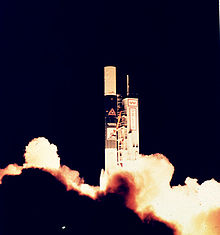 Launch of the Delta 5920 with COBE | |
| Function | Expendable launch system |
|---|---|
| Country of origin | United States |
| Cost per launch | US$34.22 million in 1985 [1] (US$79.99 million in 2018) |
| Size | |
| Height | 34 m (112 ft) |
| Diameter | 2.44 m (8 ft 0 in) |
| Mass | 201,580 kg (444,410 lb) |
| Stages | 2 |
| Capacity | |
| Payload to LEO | |
| Mass | 3,848 kg (8,483 lb) |
| Payload to GTO | |
| Mass | 1,405 kg (3,097 lb) |
| Associated rockets | |
| Family | Delta |
| Comparable | Delta 4000, Delta II |
| Launch history | |
| Status | Retired |
| Launch sites | Vandenberg SLC-2W |
| Total launches | 1 |
| Success(es) | 1 |
| UTC date of spacecraft launch | 18 November 1989 |
| Boosters – Castor 4A | |
| No. boosters | 9 |
| Height | 9.12 m (29.9 ft) |
| Diameter | 1.02 m (3 ft 4 in) |
| Empty mass | 1,529 kg (3,371 lb) |
| Gross mass | 11,743 kg (25,889 lb) |
| Powered by | Solid |
| Maximum thrust | 478.3 kN (107,500 lbf) |
| Specific impulse |
|
| Burn time | 56 s |
| First stage – Thor/Delta ELT | |
| Height | 22.37 m (73.4 ft) |
| Diameter | 2.44 m (8 ft 0 in) |
| Empty mass | 4,360 kg (9,610 lb) |
| Gross mass | 84,368 kg (186,000 lb) |
| Powered by | 1 RS-27 |
| Maximum thrust | 1,030.2 kN (231,600 lbf) |
| Specific impulse |
|
| Burn time | 223 s |
| Propellant | LOX / RP-1 |
| Second stage – Delta K | |
| Height | 5.89 m (19.3 ft) |
| Diameter | 2.44 m (8 ft 0 in) |
| Empty mass | 950 kg (2,090 lb) |
| Gross mass | 6,954 kg (15,331 lb) |
| Powered by | 1 AJ10-118K |
| Maximum thrust | 43.6 kN (9,800 lbf) |
| Specific impulse | 319 s |
| Burn time | 431 s |
| Propellant | N2O4 / Aerozine 50 |
The Delta 5000 series was an American expendable launch system which was used to conduct an orbital launch in 1989. It was a member of the Delta family of rockets. Although several variants were put forward, only the Delta 5920 was launched. The designation used a four digit numerical code to store information on the configuration of the rocket. It was built from a combination of spare parts left over from earlier Delta rockets, which were being retired, and parts from the Delta II 6000-series, which was just entering service.
The first stage was the RS-27 powered Extended Long Tank Thor, flown on several earlier Delta rockets. Nine Castor-4A solid rocket boosters were attached to increase thrust at lift-off, replacing the less powerful Castor-4 boosters used on the 3000 series. The Delta-K was used as a second stage. In the configuration that was launched, no third stage was flown.
The Delta 5000 was launched just once, from Space Launch Complex 2W at the Vandenberg Air Force Base. Launch occurred at 14:34 on 18 November 1989. It was successful, and placed the Cosmic Background Explorer (COBE) spacecraft into low Earth orbit.[2][3]
- ^ "Delta 5000". Archived from the original on September 16, 2016.
- ^ Wade, Mark. "Delta". Archived from the original on 2008-07-24.
- ^ Krebs, Gunter. "Thor Family". Gunter's Space Page. Archived from the original on 2007-08-06. Retrieved 2021-12-21.